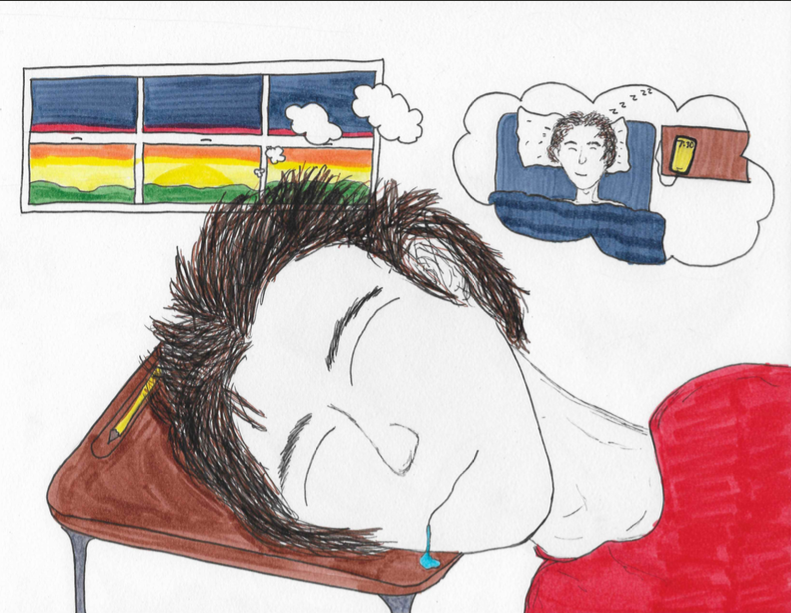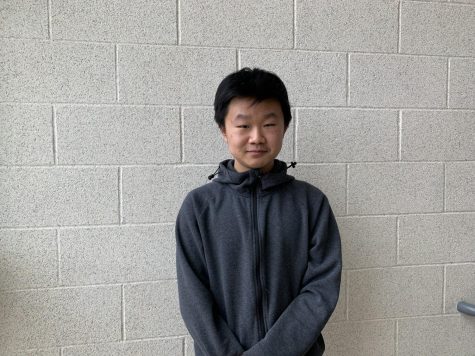Elementary and high school start times need to be swapped
Staff Writer Henry Zhang writes that the proposed alternative schedule is a step in the right direction but not enough for sleep deprived students.
June 16, 2020
It sure would be nice to start every school day at 12.
As an unforeseen effect of the coronavirus pandemic, Algonquin students get to finally enjoy restful nights. But good things never last. When fall finally rolls around, we will get hit once again by the agonizing reality of waking up at an ungodly hour.
In terms of the start time, Algonquin is an exception. We start early compared to other Massachusetts schools, and Massachusetts starts early compared to other states. We have our first bell at 7:15 AM, which puts us in the top 10 percent of schools that start before 7:30.
Not coincidentally, Algonquin also has a serious sleep deprivation problem. There have been numerous articles published about this topic which recount the magnitude of sleep loss here at Algonquin. According to a Harbinger survey conducted last year, over three-quarters of the student body attribute the majority of the issue to homework and the early start time.
If teens are losing sleep because of the school start time, then the logical solution is to push the time back, not to force them to accommodate the early start time.
The current system makes it impossible to get adequate sleep without straining the body. “Just go to bed earlier” is not an option. If people could teleport to school instantly at 7:20, then sleeping at 10:00 could work. But people can’t teleport, and due to homework, extracurriculars, and the body’s natural clock known as the circadian rhythm, a best-case schedule scenario looks more like sleeping at 11:00 and waking up at 6:00 to eat breakfast and catch the bus. That’s seven hours, which is unacceptable. Starting later would accommodate our needs – not our wants.
Any change to the start time would have wide repercussions that range from rescheduling the buses to redesigning the bell schedule. But the district seems to have accepted the cost, given the district has already proposed an alternative to the current schedule. Thus, we must seize this perfect opportunity to institute a comprehensive rehaul of the entire system that goes beyond the current proposal, switching elementary and high school start times to change things for good.
Such a change would greatly benefit both students and parents. The current proposal, which would delay the start time by 40 minutes, is a step forward in the right direction. However, people should be hesitant to support it because it does not fully capitalize on all of the gains that could be achieved from a policy like my proposed swap. It’s too much work for too little effect, so don’t bother.
While it would be a missed opportunity, there are aspects of the proposal that are commendable. The proposed schedule is more teen-friendly than our current start time and will have a measurable effect on the environment of the school.
After all, school becomes a miserable dungeon to those without adequate sleep. As a night-owl myself, I often arrive at school in a delirious state and confess to frequently dozing off in my morning classes, not quite waking up until the afternoon. This severe and chronic sleep deprivation takes a mental and physical toll. Mentally, students with less sleep retain less information, get lower grades, suffer from poor participation, and are less social. Physically, the brain deteriorates and the body is more susceptible to heart disease and weight gain over time.
With so many students averaging sub-seven hour nights, underperformance and depression become endemic problems. The district attempts to tackle these problems by tacking on an extra 40 minutes of sleep, which is not insignificant but can be much better.
Biologically, a significantly reformed start time is also more natural and beneficial toteenagers. Beyond the immediate health benefits of a good-night’s sleep, it’s well-known that teenagers are naturally inclined to sleep later. Thus, we should accommodate the circadian rhythm and work with, not against, nature.
However, a bolder swap of elementary and high school times would be a wiser use of this unique opportunity and reap far more benefits than a delay alone. A swap would be a blessing to teenagers, as it would nearly double the amount of awarded time. It would also be a blessing for many families as it would greatly simplify logistics.
The current order of school start times has the oldest kids leave first while the parents have to stay home to take care of the younger ones. This forces parents with elementary-age kids to stay home until the bus arrives at around 8-8:30 in the morning. If they miss the bus, then, for some, that means calling in late to work. For those with longer commutes or inflexible schedules (i.e. those who have to ride the train to work), this is the nightmarish reality.
By swapping the start time for high schoolers and elementary students, parents have the option of dropping their younger ones off first and safely going to work without all of the scheduling headaches. Younger kids do not have as many responsibilities and have not yet experienced the circadian clock shift, and thus can comfortably wake up early. Not only do teenagers benefit physiologically from a restructured system, but it also reduces the logistical pressure on many families. Contrast that to the district’s proposal, which would extend parental obligation by up to twenty more minutes.
Many people cherish Algonquin’s uniquely early release time, which a late start would sacrifice. An early release allows more time for sports and extracurriculars. Some people worry that a later start would result in a tighter afternoon schedule, with people getting home later and less homework time.
However, the concern for extracurriculars is mostly superfluous – there are many schools which end later than Algonquin, and none of them have trouble scheduling ample time for clubs and sports. Additionally, the extra afternoon time is mostly wasted, as our current taxing sleep regimen forces many people to take long afternoon naps, effectively nullifying the early release. Instead of forcing students to make up for lost sleep in classes and at home, it makes more sense to get it right the first time and start every day with a good-night’s sleep.
A later start time would solve many problems, but some people worry that it would only enable late-nighters and promote an unhealthy sleep schedule. But let’s face the facts. Students right now are not getting enough sleep. No doubt some of the fault lies in students themselves – by bringing phones to bed, for example. But the math and polls show that the current system is just not sustainable.
Sleep deprivation has never been solved by forcing someone to wake up earlier. The best way to ensure that students get enough sleep while also reducing the burden on families is by switching the elementary and high school start times. The current proposal is great but only half the deal.











